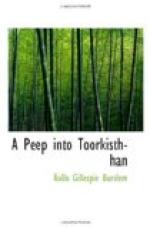On the third day after our departure from C[=a]bul, the force encamped at a place called Vaugh opposite the beautiful Ist[=a]lif, whose luxuriant vineyards and magnificent orchards have before excited the admiration of the traveller. But we had still some marches to get over before reaching the territories of the refractory chiefs, and it was not till the 29th that we came to Toottum Durrah, or valley of mulberries. Here we found the enemy posted in force, but it was merely an affair of detachments, two companies of the 13th and two of the 37th being ordered to make a detour to the right and left, so as to threaten the enemy’s flanks. The main column closing up continued to advance; the enemy did not make a very determined resistance, yet a chance shot killed poor Edward Conolly, brother to the victim of the ruffian king of Bokhara. His—poor fellow!—was a soldier’s death; though we deplore his loss, we know that he died in honorable warfare; but we have no such consolation for the fate of his poor brother, and it is with difficulty that his indignant countrymen can refrain from imprecating the vengeance of God upon the cowardly destroyer of so much talent and virtue.
The enemy made no further stand this day, and we proceeded about fifteen miles down the valley to Julghur, destroying before our departure the mud forts of Toottum Durrah. At Julghur the enemy shewed more resistance; they trusted in the strength of their fort, and we perhaps too much to its weakness. The result was, that a wing of the 13th, not more than one hundred and twenty strong, suffered a loss of fourteen men killed and seventeen wounded, and the enemy were eventually shelled out by the batteries under the direction of Capt. Abbott.
The following morning we buried our gallant companions, amongst them our respected serjeant-major (Airey), in one deep grave; but a report was current, that shortly after our departure, the bodies had been disinterred and exposed in front of the grave, that every Affgh[=a]n might witness and exult in the disgrace to which they had subjected the corpses of the Feringhis.
This is but a single instance of the hatred which actuated our enemy, and when we consider the exasperating effects of these cowardly outrages on the minds of the soldiery, we should the more admire the generosity and clemency of the British in the hour of victory. I am aware that ill-informed people have accused our armies in Affghanist[=a]n, especially after the advance of General Pollock’s force, of many acts of cruelty to the natives, but I can emphatically deny the justice of the accusation. Some few instances of revenge for past injuries did occur, but I am sure that an impartial soldier would rather admire the forbearance of men who for days had been marching over the mangled remains of the C[=a]bul army.




